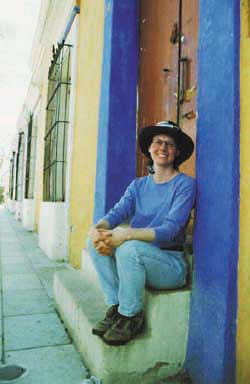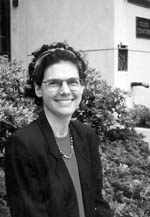Student’s legacy is tool from which others learn

A memorial service will be held this coming Saturday (Oct. 14) for a Harvard graduate student who found an opportunity to serve others under the most challenging of personal circumstances.
Julie Goldman, a graduate student in anthropology, died Sept. 8 after a five-year struggle with cancer. She was 37.
From 1998 until her death, Goldman worked with her oncologist Lidia Schapira, a member of the Medical School faculty, to teach doctors how to better care for patients with terminal illness. She published articles, spoke at professional conferences, and made videos which are now in use in medical education.
“She wanted to teach doctors how to still give good care to people who aren’t going to get better,” said Lida Junghans, Goldman’s friend and fellow graduate student, who is organizing the memorial service. “She taught doctors how the world is viewed by a terminally ill person. That’s the enduring value of Julie’s work.”

Goldman was working on a Ph.D. dissertation on the effect of globalization on female fruit packers in Chile when she was diagnosed with breast cancer. Her illness prevented her from finishing her thesis, but on Aug. 24, anthropology Professor David Maybury-Lewis, Goldman’s dissertation adviser, along with Peter Ellison, professor of anthropology and associate dean of the Graduate School of Arts and Sciences, and Pauline Peters, lecturer in anthropology, came to Goldman’s hospice bedside to award her a certificate of distinction for her academic work.
“We wanted to recognize her outstanding scholarly work which her illness prevented her from receiving the rewards of, and so we invented the certificate of distinction and awarded it to her in a very proper ceremony,” Maybury-Lewis said.
He added that Goldman’s “dignity and courage in the face of death were an inspiration to us all. It was humbling to visit her and realize that she was still carrying on her work and still writing poetry. Her focus and energy were remarkable considering what she was up against.”
After her initial diagnosis, Goldman received treatment, and for a while the cancer seemed to be in remission. But in 1996 she learned that it had metasticized to her liver and lungs.
In 1998, she moved into a hospice facility in Needham because she appeared to be within a few months of dying. But unexpectedly, the progress of the disease halted, and she became well enough to leave the hospice. It was at this point that she decided to devote herself to educating doctors about the needs of the terminally ill.
The memorial service for Goldman will be held in Dudley House at 11 a.m., Oct. 14.




